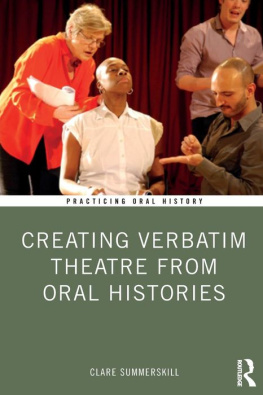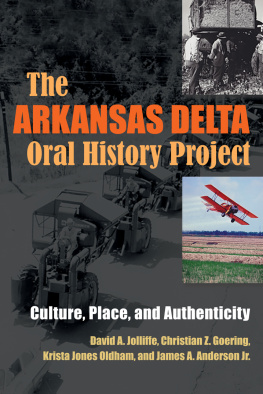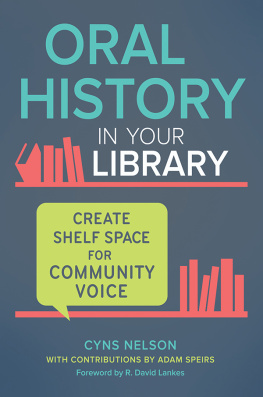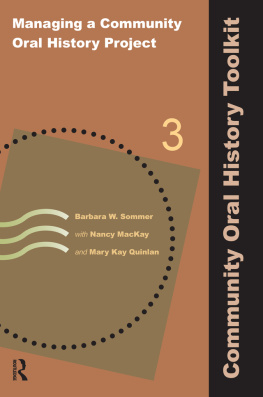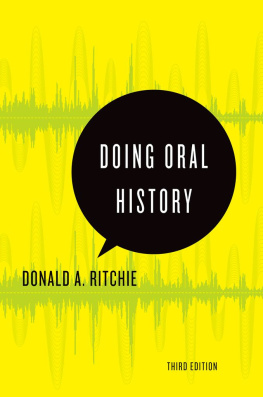Practicing Oral History in Historical Organizations
Practicing Oral History Series
Series Editor
Nancy MacKay, San Jose State University
Museums, historical societies, libraries, classrooms, cultural institutions, alumni associations, and neighborhood groups are among the growing list of organizations that use oral history to document their own communities. At present, there are no handy resources for these professionals to plan and implement an oral history project within their own professional frameworks.
The Left Coast series Practicing Oral History fi lls this gap. Series titles consist of concise, instructive books that address the special circumstances of oral history within a specifi c user community. Each title provides practical tools for conducting and presenting an oral history project that conforms to the best practices of the Oral History Association but targets the particular needs of a community.
Practicing Oral History in Historical Organizations, Barbara W. Sommer
Practicing Oral History with Immigrant Narrators, Carol McKirdy
Curating Oral Histories, Second Edition: From Interview to Archive, Nancy MacKay
Story Bridges: A Guide for Conducting Intergenerational Oral History Projects, Angela Zusman
PRACTICING ORAL HISTORY
IN HISTORICAL ORGANIZATIONS
Barbara W. Sommer
First published 2015 by Left Coast Press, Inc.
Published 2016 by Routledge
2 Park Square, Milton Park, Abingdon, Oxon OX14 4RN
711 Third Avenue, New York, NY 10017, USA
Routledge is an imprint of the Taylor & Francis Group, an informa business
Copyright 2015 Taylor & Francis
All rights reserved. No part of this book may be reprinted or reproduced or utilised in any form or by any electronic, mechanical, or other means, now known or hereafter invented, including photocopying and recording, or in any information storage or retrieval system, without permission in writing from the publishers.
Notice:
Product or corporate names may be trademarks or registered trademarks, and are used only for identification and explanation without intent to infringe.
Library of Congress Cataloging-in-Publication Data
Sommer, Barbara W., author.
Practicing oral history in historical organizations / Barbara W. Sommer.
pages cm. (Practicing oral history series)
Includes bibliographical references and index.
ISBN 978-1-61132-863-9 (hardback : alk. paper) ISBN 978-1-61132-864-6 (pbk. : alk. paper) ISBN 978-1-61132-865-3 (institutional ebook) ISBN 978-1-61132-866-0 (consumer ebook)
1. Oral historyHandbooks, manuals, etc. 2. Oral historyMethodology.
3. InterviewingHandbooks, manuals, etc. 4. HistorySocieties, etc. I. Title.
D16.14.S693 2015
907.2dc23
2015018433
ISBN 978-1-61132-863-9 hardback
ISBN 978-1-61132-864-6 paperback
Contents
There has never been a better time for oral history. The methodology developed in the latter half of the twentieth century by and for academics has laid the foundation for a new generation of practitioners whose innovative ideas and comfort with technology put a twenty-first century spin on the field. Museum curators, public historians, teachers, artists, scientists, and activists are some of the user communities who apply oral history to their work. Most of these practitioners dont have the time or interest for an in-depth study of methodology; they want the tools to create the best oral histories possible within the framework of their own professions.
The Practicing Oral History series is designed for these readers. Each volume is organized to give readers a snapshot of some aspect of applied oral history, providing the context for the topic, the tools and best practices for applying oral history to their own work, and how to find additional expertise when needed. Each book is self-contained, giving the reader the necessary methodology, context, and practical tools between the covers, without an overload of information.
Historical organizations, according to author Barbara Sommer, collect, preserve, and interpret history for a public audience. They include history museums, local history societies, historical libraries and archives, government records programs, state historic preservation offices, and historic sites. They can be large or small, have a large budget or no budget at all, be embedded within a large government bureaucracy, or operate independently. The attribute that historical organizations consistently have in common is support and interpretation of history according to their stated missions.
Many of these organizations include oral history. For example, the State Historical Society of Missouri has almost 5,000 interviews in its collections and employs a full-time oral historian; the Kentucky Oral History Commissions collections hold 10,000 oral histories; the Minnesota Historical Society has 2,500 interviews as well as a museum and public programs; and the Maria Rogers Oral History Program, a public library-based oral history program in Boulder, Colorado, has conducted and archived more than 2,000 oral histories. Clearlyand logicallyoral history has an important role in historical organizations.
In spite of such a strong interest in oral history among historical organizations, almost nothing has been published on the topic. Sommer acknowledges oral historian Willa Baums Oral History for the Local Historical Society, first published in 1969, as her inspiration for this book. She uses Baums work as a springboard for a much needed update designed particularly for this audience, acknowledging the myriad of changes in four decades.
I can think of no one more qualified to write this book. Barbara Sommer has spent the past forty yearsand continuing to this dayas the go-to person for doing oral history within historical organizations. Not only does she consult at high levels, develop budgets for oral history projects, facilitate oral history workshops, and speak and teach widely, she also conducts oral history interviews on a regular basis. If there is anyone who understands the full picture of doing oral history within historical organizations, it is Barbara.
One of the strengths of this book is the set of examples. Barbara showcases twelve historical organizations to illustrate the variety of groups that include oral history in their mission; and the various ways they collect, curate, and present them. One particularly interesting example is the Commission of Deaf, DeafBlind, and Hard of Hearing Minnesotans Oral History Project. This project illustrates how the boundaries of oral history can be successfully stretched to serve a population for whom oral is not the standard way of communicating. The seven interviews illustrate how oral history is truly a democratic practice and can be successfully used in advocating for social change.
Practicing Oral History in Historical Organizations is full of such surprises, as well as tips, checklists, and points to ponder. This book is long overdue and is likely to find a wide audience among the many historical organizations that collect, archive, and use oral history.
Nancy MacKay
Berkeley, California
February 2015
This idea for this book grew out of a conversation with Nancy MacKay, oral historian and editor of this series, and Mitch Allen, publisher and owner of Left Coast Press, Inc. Nancy, Mary Kay Quinlan, and I had finished the


